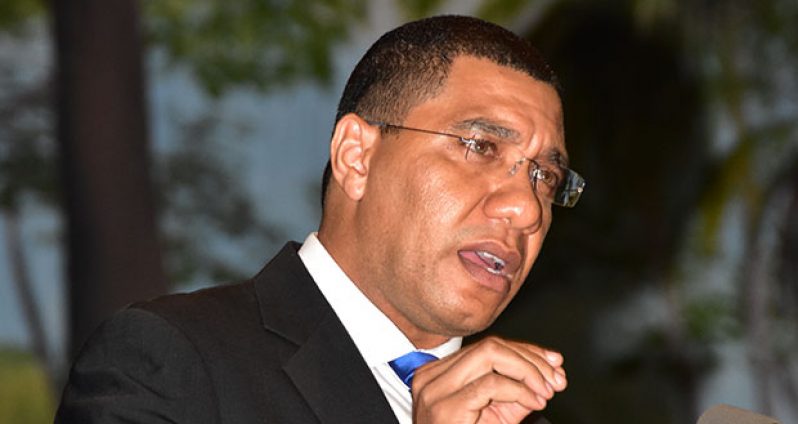–Holness wants treatment of countrymen at ports of entry urgently addressed
By Ariana Gordon
JAMAICA Prime Minister Andrew Holness has called on CARICOM leaders to urgently address the issue of Jamaicans being severely questioned at ports of entry of sister territories, and their being denied entry.During the opening ceremony of the 37th Regular Meeting of the Heads of Government of CARICOM Member States, held at the National Culture Centre on Monday, Prime Minister Holness made this pitch:
“Jamaicans have been expressing concerns of increased cases of denial of entry and treatment at ports of entry at other jurisdictions. This must be urgently addressed in a meaningful way, otherwise the economic sense of CARICOM becomes increasingly questionable”.
The free movement of Jamaicans to other CARICOM countries is currently being discussed bilaterally; and, thus far, Prime Minister Holness said, he is encouraged by the level of understanding and responsiveness being expressed towards those concerns.
“We believe that bilateral consultations, supported by additional effort in the institution of our community, can make the movement of labour equal to that of the movement of goods,” the Prime Minister said.
Jamaicans have, over the years, complained about the treatment meted out to them in Trinidad and Tobago. As a result of many Jamaicans being denied entry there, the Jamaican Private Sector has led a boycott against goods manufactured in Trinidad; but with establishment of the Caricom Single Market and Economy (CSME), discrimination on the ground of nationality in all member states was abolished.
Under the CSME, the free movement of persons across the region entails removal of the work permit requirement for university graduates, media workers, sports persons, musicians, artists, managers, supervisors and other service providers. Freedom of movement also includes the freedom to leave and re-enter any member state of one’s choosing, and to have access to property either for residential or business purposes.
Prime Minister Holness stressed the importance of regional integration to the development of the regional bloc. He said regional integration is not an end in itself, but a means to achieve a much broader objective; notably, the economic growth and development of countries in the region, and the improvement of the lives of its people. This, he said, will allow small economies to overcome regional constraints, build resilience, and take advantage of new and existing opportunities in the global market place.
“Regionally, integration processes like the CSME can deliver economic and welfare agreements, but we must be mindful of the fact that the CSME as a mere concept cannot deliver these promises. As a functional and transformative integration process, however, CSME can deliver the much-needed economic pillars,” he declared.
ALWAYS SUPPORTIVE
Jamaica, he said, has always been supportive of the CSME, and has undertaken the necessary changes to legislation to ensure that all of the obligations under the agreement are fulfilled.
“Jamaica now provides a strong, transparent, and predictable regulatory environment for those who wish to relocate there for work purposes. This is indeed an important pillar of the regional integration process. For many, including the man in the street, free movement represents a tangible way in which we can benefit from regional integration,” the Jamaican Prime Minister explained.
He believes there needs to be much more bilateral relations among member states. He said its strengthening has received insufficient attention over the years, and this must change.
Jamaica has commenced negotiating a joint commission agreement with Trinidad and Tobago, through which it hopes to develop mutually beneficial cooperation. Holness believes that similar undertakings with sister territories will prove beneficial and progressive.
Holness also called on all CARICOM leaders to listen to the cries of the people of the region. “Mr Chairman, we are witnessing a new era in Caribbean development, where the demands and expectations …are greater than ever before. Mr Chairman, if there is a lesson that all leaders can learn from the Brexit experience, it is that you must listen to the voice of your people, and respond.”
He said it is incumbent on all Heads of Government to listen to the “clear call of our people for economic growth, security, prosperity and social wellbeing”.
He opined that, collectively, the 15 member states of CARICOM have what it takes to cater to the needs of CARICOM citizens. “It is in unity that we find strength. We must always remember that our strength of purpose is as strong as our weakest member, and therefore we must work together to make all our members strong and robust. Strong countries, booming economies, robust societies will make a strong region,” said Prime Minister Holness.
He disclosed that a commission has been established in Jamaica to review that country’s relations within CARICOM and the ACP/CARIFORUM framework. That Commission will, among other things, examine the extent to which Jamaica’s participation at CARICOM has impacted its economic growth and development process.
Holness said, too, that CARICOM arrangements relative to the wider Caribbean, including the Dominican Republic and Cuba, will also be reviewed. This is the first time that a Commission has been established in Jamaica to assess the benefits, opportunities and challenges of the country’s membership in CARICOM.



.jpg)








